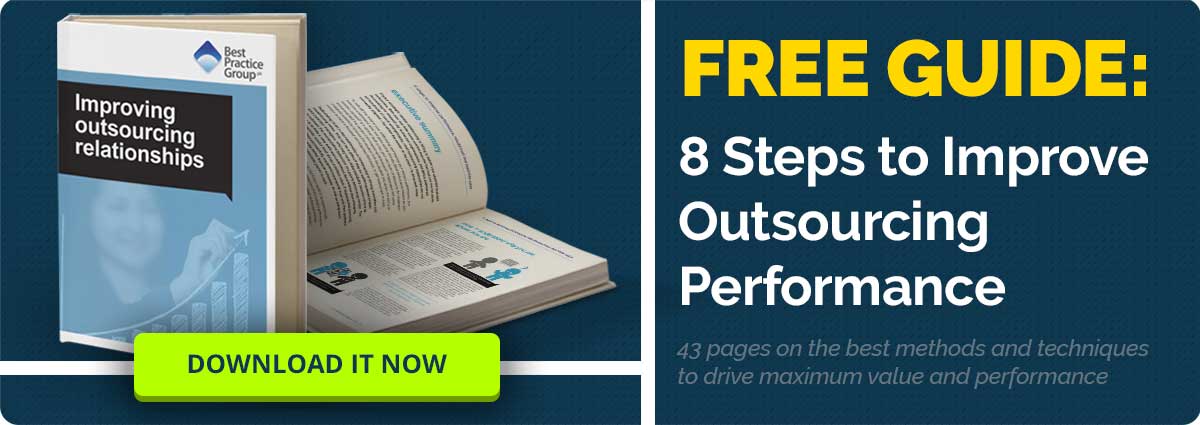 Welcome to the third article in our series on the collection of facets and intrinsic value of an Intelligent Supplier – what your supplier could be doing to ensure your relationship has a greater chance of success, and how you can identify whether they have this capability, capacity and foresight. Article #1 in the series focused on ‘Understanding, Supporting (and Challenging) the Client’s Business and Operating Strategy’, Article #2 was on ‘Supporting the Client’s (often Changing) Business Objectives’. This article dedicates itself to that most vital of relationship engines, ‘Commercial Trust’ and evidencing commercial trust.
Welcome to the third article in our series on the collection of facets and intrinsic value of an Intelligent Supplier – what your supplier could be doing to ensure your relationship has a greater chance of success, and how you can identify whether they have this capability, capacity and foresight. Article #1 in the series focused on ‘Understanding, Supporting (and Challenging) the Client’s Business and Operating Strategy’, Article #2 was on ‘Supporting the Client’s (often Changing) Business Objectives’. This article dedicates itself to that most vital of relationship engines, ‘Commercial Trust’ and evidencing commercial trust.
An intelligent supplier will be capable of evidencing commercial trust, from the way in which it works with other clients, that it performs all appropriate due diligence and asks ‘all the right questions’ of its clients in any new project work or change variations. In other words, an intelligent supplier must be able to demonstrate strong ‘Commercial Trust’ behaviour.
It will come as no surprise to learn that this is another challenging subject to quantify. Whenever people talk about ‘trust’, the natural assumption is that someone is talking about one’s ‘integrity’. While they often go hand in hand, commercial trust is slightly different.
The most financially and reputationally successful strategic and complex project service delivery relationships have at their heart a foundation built on commercial trust, and intelligent clients and intelligent suppliers work better together and drive greater value in a commercial trust led environment.
This claim is evidenced in a report titled ‘Improving Outsourcing Relationships’ that can be found at https://www.bestpracticegroup.com/free-improved-outsourcing-ebook/ (Pgs.18-28) showing that client and supplier organisations that pursued a path of improved commercial trust saw an improvement in their financial and reputational performance by up to 98%. From the nearly 600 complex project relationships we have been involved in, we have found this not at all surprising, as such an uptick is governed by the capabilities of individual organisations and the restrictions they must work within while looking to improve their performance.
Evidencing Commercial Trust Behaviour
So, what type of behaviour constitutes commercial trust? We have all had that ‘instinctive’ feeling that someone will (or is likely to) behave well towards you – and equally, that they will not. This feeling is usually driven by your previous experiences with individuals that have behaved in a similar manner towards you, influencing your insight in the present.
Commercial trust is hard won and easily lost. It is demonstrated by individuals who do what they say they will do, when they say they are going to do it. This is a very simple statement for what are, in practice, behaviours that are hard to deliver on a consistent day-to-day basis in complex project relationships. Pages 18-31 of the Improving Outsourcing Relationships paper at https://www.bestpracticegroup.com/free-improved-outsourcing-ebook/ goes into much more detail around the specifics of this.
In principle, however, an example of commercial trust behaviour being demonstrated by an intelligent supplier would be:
- The client requests that some out-of-scope activity be performed by the supplier.
- The supplier has an intelligent dialogue with the client about “as a result of the out-of-scope activity, what will change within the client’s business or operational processes once the project has been implemented and the client is realising the benefits from it. In other words, what challenges will be overcome and what quantified benefits will the client achieve when the project is completed, and by when”. This becomes the client’s requirements for the out-of-scope activity.
- The supplier responds with a due diligence process to get to a proposal (or business case) for the client to be supported in achieving those outcomes.
- In turn, the resulting proposal is priced at a level where the client can see the evidence that the pricing, operating assumptions and terms for the proposal/business case have been arrived at using a transparent, fair and equitable process.
In other words, the supplier’s response is measured, quantified, qualified and communicated, openly. An example of commercial trust failing is when the supplier is perceived as ‘trying it on’ with its pricing for out-of-scope activity, despite all of the added value they have brought to the relationship over time. Even if the supplier’s existing service delivery is seen as competent, a lack of commercial trust will degrade the relationship over time and it will gradually decline into a price sensitive and input activity basis.
To expand on this a little further, below we have set out two examples, one where a supplier evidences their commercial trust through its behaviours, and one where the evidence suggests the opposite to be true:
A client can ‘trust’ that its supplier will not attempt to take unfair advantage of it if it acts in a similar way to the example below:
- A client asks its supplier to undertake some out-of-scope work and/or a new project.
- Rather than the incumbent supplier taking the approach that the client is effectively ‘locked in’ to using it, the supplier clarifies the validity of the client’s expected outcomes from the initiative.
- If the supplier suspects the client requirements is not clear or is potentially misaligned to what if feels the client really wants, it assists the client in articulating its outcomes, rather than just blindly accepting the project.
- Once the outcomes are clear, it works with the client to explore the most effective manner in which the outcomes can be delivered, in an open book and transparent way. If the outcomes of the project cannot be sensibly achieved, the supplier explains this to the client, along with the reasons why.
- Where the outcomes can be sensibly achieved, at each stage through the project/initiative, the supplier critical-friend challenges both its own and the client approach to measuring that the initiative is on track to deliver the outcomes expected. Where it is not, it will realign the activities and behaviours to assure the success of the initiative.
Contrast the commercial trust behaviour above, with a ‘poor’ or ‘non-intelligent supplier’ behaviour example:
- A client asks the supplier to undertake some out-of-scope work and/or a new project.
- The supplier does not critical-friend challenge the client on its outcomes. Nor does it explore with the client the most effective manner to achieve the client’s perceived outcomes.
- The supplier quotes for the project, knowing the client is effectively ‘locked in’ to using it. It proposes costs that are often far higher (poor value for money) than a comparatively priced bid (taking into account similar risks that another external supplier would appropriately bear).
- The supplier then simply undertakes the project with few of the ‘right’ questions about the project being asked.
- No measurements for the initiative are put into place that effectively monitor whether the project/initiative will achieve the outcomes (whether these are appropriate or not) or value for money for the client.
This type of poor behaviour from a supplier evidences the supplier’s clear lack of intelligence and that the interests they are seeking to serve are merely their own. Ironically, by their adopting this approach, it does not serve either their own interests or that of the client. A lose-lose all around.
Conclusion
Commercial trust can be demonstrated and it can be earned. Doing what you say you will, when you say you will, is the most critical aspect. Other examples of commercial trust-winning good behaviour include accepting responsibility for what goes well and what does not, going over and above the call of duty for the good of the relationship, and a strong commitment to innovation. It is also worth considering that your strategic partner will, on occasion, be required to seek validation for the accuracy of your assertions or quotations without fear of this impacting on the commercial trust that exists between you. This is by no means an exhaustive list, but the right environment must be created for commercial trust to thrive.
To view either of the first two articles in this series, on an Intelligent Supplier’s responsibilities when it comes to a Client’s ‘Business and Operating Strategy’, or their ‘Business Objectives’ click on these links. Watch out for Article 4 on an intelligent supplier’s role as a ‘Constructive Critical Friend’, coming soon.
Photo credit: iStock, metamorworks


